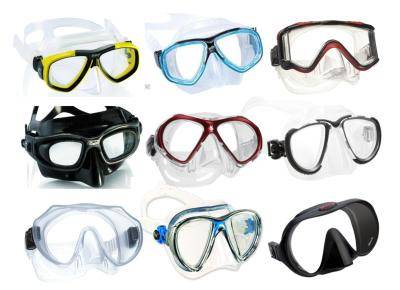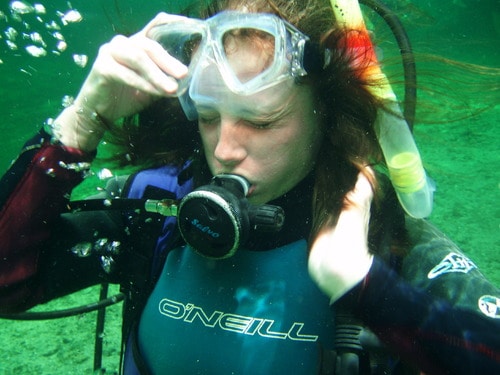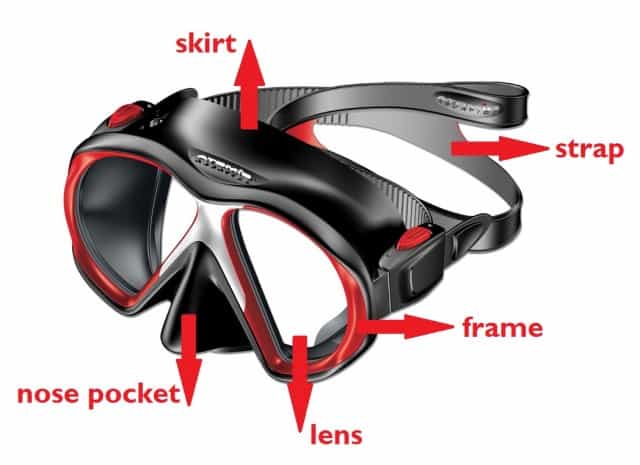It’s a fact! We humans cannot see well and focus our eyes underwater, can we? Some people call it a dive mask, others call it SCUBA mask while there are others who call them googles. No matter what we call it, divers rely solely on these masks to see clearly when underwater.
In fact, it is said that dive masks were used as early as the 1300s. This is when Persian Divers used tortoise shells to cover their eyes when diving. But it was in the 1950s, when SCUBA Diving became so popular that people started to create their own masks using lens and rubber.
Aside from enabling our eyes to focus underwater, the dive mask also encloses our noses and allows us to equalize our ears as we go deeper into the sea, allowing more time underwater to go deeper and see more marine life. Having a durable, quality and good fitting mask is a definitely a must for every diver. After all, you didn’t dive just to spend time clearing your mask! You go Scuba Diving to relax and enjoy what the underwater beauty has to offer, right? Thus, it is absolutely vital to dive with a comfortable and leak-free mask.
I know! Choosing your first dive mask can be exciting but at the same time overwhelming! So before you rush out to the nearest local dive shop, here is some advice to help you choose the best dive mask for you!
DO’s in choosing a dive mask
-
- Do purchase your mask at a dive store. Aside from the variety of masks in there, dive store personnel are the most appropriate and capable people to help you choose the best mask for you.
- Do decide as to what mask style you want for yourself. Masks come in different colors, designs and shapes. There are oval shaped masks that were very popular with divers years back. There are also modern masks, which include mask with side panels and those that offer wide viewing.

From colorful to stylish masks, there are tons of dive masks in the market nowadays. So pick one that both fits your face and your preference.
- Do check the material that the dive mask is made of. Generally, masks nowadays have silicone rubber skirts that are either semitransparent or black. The black skirted masks are usually used by underwater photographers because of its ability to reduce glare.
- Do look for features that are fit and suited for SCUBA diving. For safety purposes, the mask glass should be made of tempered glass. For equalizing, it should have nose pockets which will allow you to pinch your nose to clear your ears. Make sure also that the nose pocket is not too tight or too large.The mask should also be equipped with straps that can be adjusted and locked.
- If you are wearing eyeglasses, contact lens or have an imperfect vision then do check which brand offers dive masks with prescription lenses. This way you’ll be ensured to get the most of your diving adventure.
- Do always choose the mask that fits your face. Here are some basic steps on how to fit a mask:
- Carefully position and place the mask against your face. Never use the strap so keep it up or away from your face.
- Take a breath or inhale mildly through your nose.
- Now remove your hand.
- Did the mask feels like falling from your face or do you need to hold the mask on? If yes then it’s not a good fit!
- Did the mask stay or stick to your face without the help of your hand? If yes then it’s a good fit! As much as possible, keep the mask on your face for a minute or two. You can bring your snorkel so you can try if the mask will leak when you use a snorkel. If no snorkel is available, you can also pout your lips or pretend to have a regulator in your mouth. You may also want to bring your diving gloves (if you dive with it) to check whether you can easily pinch your nose through the nose pocket even with the gloves on your hand.
- Exhale through your nose to release the seal and you can now remove the mask.
- Check for marks on your face. If you had a red line around your face then the seal was too tight and the mask is not for you. Continue fitting other masks until you find the right one for you.
This video simply explains and shows how to check that your mask fits you.
DON’Ts in Choosing a Dive Mask
- Don’t choose a mask with a plastic skirt as it sometimes can cause rashes and allergies! The mask will more likely to leak as well.
- Don’t choose a mask made of plastic and standard glass. Both material are known to leak, crack, break and are dangerous or hazardous if accidentally broken.
- Don’t ever buy a cheap or low quality mask! They may exactly all look the same but diving with comfortable and good quality dive masks ensures a much better diving experience!

Mask clearing is one of the basic skills you learn in your dive training. This skill is very important in case you got your mask fogged. However, constantly doing so due to mask leaking will totally ruin your dive adventure.
The bottom line is to simply choose the perfectly fitting mask that will never leak during your dive. And always remember that even if you have the rest of your SCUBA diving gear in good condition, you won’t be able to enjoy your underwater adventure without a diving mask. After all, the underwater scenery is exactly the reason why you are diving. 
 Destinations
Destinations










Another tip I can add is that, before donning your beautiful newly-purchased mask, make sure that you chose the one with good quality and possesses specifications suitable for scuba diving.
There are only few things worse than a leaking dive mask that may ruin our dives. We always try to clear our mask, that results:
*more air usage
*less bottom time
*less time to see the underwater
*poor vision
All these parameters come together and we don’t enjoy our dives. Fortunately, there are easy steps (like told above in the article) for choosing a leak-proof dive mask.
You can read my article on the same subject here for more info: http://www.divewithseaman.com/5-steps-to-choose-a-leak-proof-mask/
Thank you.
Pingback: Batangas Beach Resorts : How to choose your Dive Computers : Discount Vouchers | Travel and Tour Batangas | Your Deal Is Here
This information you provides us very useful.Thank you
The best way to purchase a diving mask is to do some research on some top masks and then look for these at the store.